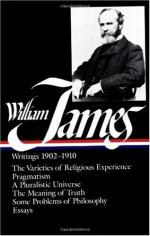
|
| Name: _________________________ | Period: ___________________ |
This test consists of 15 multiple choice questions and 5 short answer questions.
Multiple Choice Questions
1. What does James say about his philosophy compared to the philosophy of the subject in "A Pluralistic Mystic"?
(a) Their philosophies are quite different.
(b) Their philosophies are very similar.
(c) They share the same inspiration but still differ in other ways.
(d) They share a common foundation.
2. What does James describe as the second virtue of pluralism?
(a) Melioristic outlook.
(b) Optimistic outlook.
(c) Rational outlook.
(d) Pessimistic outlook.
3. What is the name of the subject of "A Pluralistic Mystic"?
(a) Barron.
(b) Barrington.
(c) Bringinger.
(d) Blood.
4. According to James, what is the nature of Dewey's school?
(a) Monist.
(b) Pluralist.
(c) Empiricist.
(d) Rationalist.
5. Critics of pragmatism assert that pragmatism is a revision of which stance?
(a) Theism.
(b) Pessimism.
(c) Positivism.
(d) Rationalism.
6. What is PhD Octopus about?
(a) Students gaining significant knowledge.
(b) Students being directed toward passing tests.
(c) Students failing classes because they do not learn enough.
(d) Students cheating on tests.
7. What is the first aspect of the truth that James points out?
(a) Optimism.
(b) Rationalism.
(c) Connotation.
(d) Realism.
8. What concept does James say counters the way reality is perceptually experienced?
(a) Percepts.
(b) Pluralism.
(c) Virtues.
(d) Monism.
9. Who was the first to say, "I think therefore I am"?
(a) Descartes.
(b) Aristotle.
(c) Shakespeare.
(d) Plato.
10. What does James address in Chapter IV?
(a) Continous percepts.
(b) Direct experience.
(c) Discrete concepts.
(d) Metaphysical problems.
11. Lecture XI discusses which concept?
(a) Rationalism.
(b) Logic.
(c) Absolute.
(d) Criticism.
12. According to James, what can be an object for several minds?
(a) Ignorance.
(b) Experience.
(c) Action.
(d) Motion.
13. What does James attribute to determining response actions?
(a) Concepts.
(b) Perceptions.
(c) Thoughts.
(d) Feelings.
14. According to James, monism does not allow for what kind of consciousness?
(a) Experienced.
(b) Infinite.
(c) Ignorant.
(d) Finite.
15. What concept does the story about the Philippine address discuss?
(a) French Imperialism.
(b) American Expansionism.
(c) German Expressionism.
(d) English Philosophy.
Short Answer Questions
1. Critics of pragmatism assert that pragmatism is a revision of which concept?
2. Where did James experience an earthquake?
3. In the lectures about the meaning of truth, what does Lecture I relate to?
4. What does Lecture IX relate to?
5. Why does James say that feelings are important?
|
This section contains 367 words (approx. 2 pages at 300 words per page) |

|




